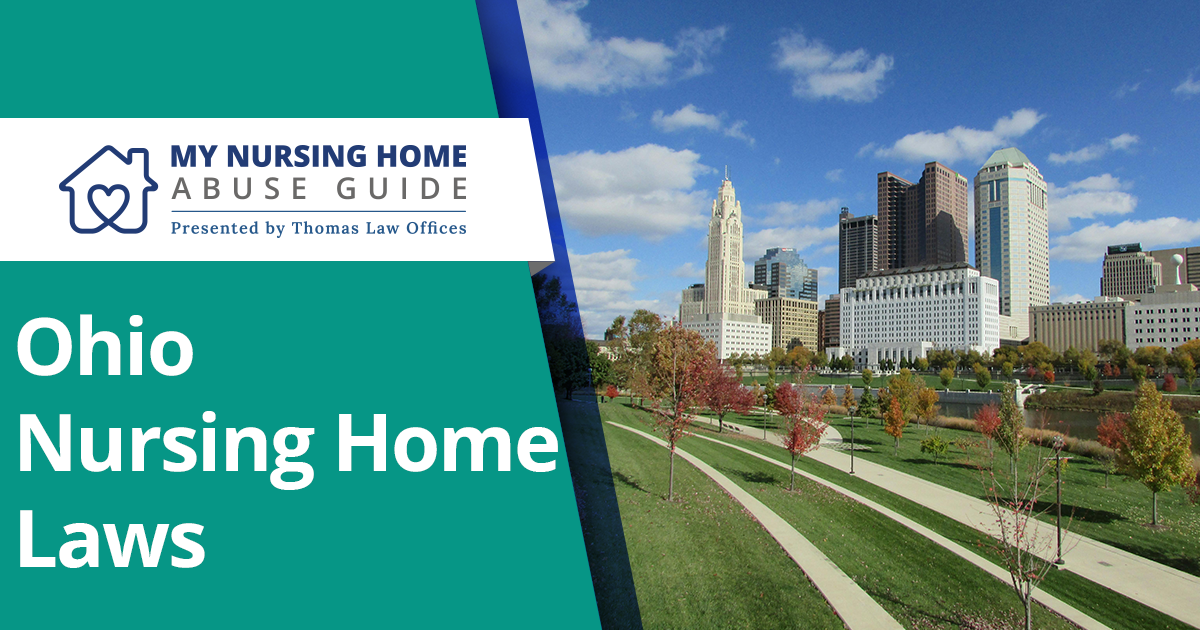Your Guide to Nursing Home Abuse & Prevention
Millions of elderly adults live in nursing home facilities.
Every one of them deserves to feel safe, protected, and respected.
Millions of elderly adults live in nursing home facilities.
Every one of them deserves to feel safe, protected, and respected.

Nursing homes play a crucial role in providing care and support for the elderly population in Ohio.
However, ensuring the safety and well-being of residents requires adherence to specific Ohio nursing home laws and regulations that govern these facilities, ensuring quality care and protection for seniors.
In addition to federal nursing home laws and regulations, Ohio has established comprehensive statutes to safeguard the rights and interests of residents. These laws cover various aspects, including resident rights, staffing requirements, quality of care standards, and facility licensure.
One of the fundamental aspects of Ohio nursing home laws is the protection of resident rights.
Residents are entitled to a range of rights outlined by state laws to ensure their dignity, autonomy, and well-being. Some of these rights include:
Overall, Ohio nursing home laws aim to empower residents and ensure their rights are upheld, promoting their well-being and quality of life while residing in long-term care facilities.
Ohio law also mandates that facilities provide residents with a written statement of their rights upon admission.
Adequate staffing is vital for ensuring the quality of care in nursing homes. Ohio law specifies minimum staffing requirements to ensure residents receive the necessary attention and assistance.
These requirements encompass nurse-to-resident ratios, certified nursing assistant (CNA) staffing levels, and staff training mandates. By adhering to these staffing standards, nursing homes can maintain a safe and supportive environment for residents.
Ohio laws also establish standards for the quality of care provided to residents. These standards encompass various aspects, including medical care, nutrition, hygiene, and overall well-being.
Facilities are required to develop and implement care plans tailored to each resident’s needs, ensuring personalized and comprehensive care. Regular inspections and evaluations help monitor compliance with these standards and address any deficiencies promptly.
To operate legally in Ohio, nursing homes must obtain and maintain appropriate licensure from the state regulatory authorities. The Ohio Department of Health currently licenses approximately 960 elder-care facilities.
Licensure requirements include meeting specific criteria related to staffing, facility infrastructure, safety protocols, and quality of care standards. Additionally, nursing homes are subject to routine inspections and audits to ensure ongoing compliance with licensure requirements.
Ohio nursing home laws outline enforcement mechanisms to address violations and ensure accountability. Regulatory agencies have the authority to investigate complaints, conduct inspections, and impose sanctions against non-compliant facilities.
These sanctions may include fines, license suspension or revocation, and other disciplinary actions to protect residents’ rights and safety.
Ohio’s regulatory oversight of nursing homes is primarily managed by the Ohio Department of Health (ODH) and the Ohio Department of Aging (ODA). These agencies work together to ensure that these residential homes comply with state and federal regulations, maintain quality standards of care, and protect the rights and well-being of residents.
By working with these regulatory agencies, Ohio’s nursing homes can uphold standards of care, ensure compliance with regulations, and promote residents’ health, safety, and well-being.
Ohio nursing home laws are designed to uphold the highest standards of care and protection for seniors residing in long-term care facilities. By understanding and adhering to these statutes, facilities can create a safe and supportive environment where residents receive the quality care they deserve.
Continuous monitoring, enforcement, and collaboration between regulatory agencies, facilities, and stakeholders are essential to ensure compliance and safeguard the well-being of residents across Ohio.
This website was created and is maintained by the legal team at Thomas Law Offices. Our attorneys are experienced in a wide variety of nursing home abuse and neglect cases and represent clients on a nationwide level. Call us or fill out the form to the right to tell us about your potential case. We will get back to you as quickly as possible.
866-351-2504